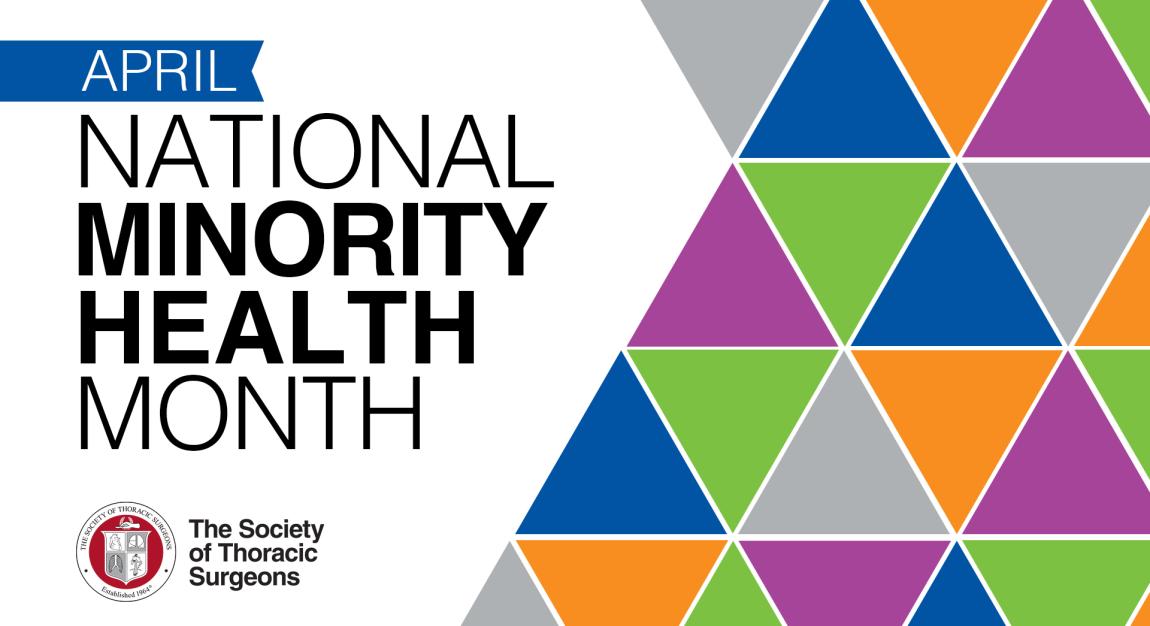- April is National Minority Health Month, a time and opportunity to raise awareness about the importance of improving the health of racial and ethnic minority communities and reducing health disparities.
- While our patient population in the US is rapidly diversifying, our specialty of cardiothoracic surgery remains one of the least diverse specialties in terms of gender and race.
- Learn about the STS Workforce on Diversity, Equity, and Inclusion's work dedicated to leading best practices, new resources, and effective initiatives to nurture an environment of diversity and inclusion within the Society and the broader specialty.
April is National Minority Health Month, a time and opportunity to raise awareness about the importance of improving the health of racial and ethnic minority communities and reducing health disparities. While our patient population in the US is rapidly diversifying, our specialty of cardiothoracic surgery remains one of the least diverse specialties in terms of gender and race.
The Society of Thoracic Surgeons created an initial Task Force on Diversity, Equity, and Inclusion in 2017 to better understand the depth of DEI knowledge and practices throughout STS and the cardiothoracic surgery specialty. Our Task Force has grown into an active and diverse Workforce on DEI, and members advise STS leadership on DEI best practices, develop resources, and undertake initiatives to nurture an environment of diversity and inclusion within the Society and the broader specialty.
In addition to working on issues of importance to the professional development of cardiothoracic surgeons, the DEI Workforce leads within STS by addressing the critically important issues surrounding health disparities. Social determinants of health, such as built environment, food access, racism, discrimination and violence, are widely recognized to have a large impact on health and health equity.

A growing body of evidence shows that the intersection of gender, race and culture between healthcare providers and patients has a strong influence on health outcomes. The STS has long been a staunch advocate for improving the lives and wellness of patients through the care that its surgeons deliver to their patients and community.
Within the cardiothoracic surgery community, we strive to diversify our surgeon workforce to reflect the racial, ethnic, gender, and socioeconomic diversity of the patients that we serve. In a 2020 data analysis from the Association of American Medical Colleges, only 17.6% of US cardiothoracic faculty were women, 6.8% were underrepresented minorities, and 1.3% of cardiothoracic faculty were underrepresented women (Erkmen et al 2022).
These numbers have improved with holistic recruitment, scholarship programs, and mentorship. STS and other national organizations, such as Women in Thoracic Surgery, Association of Black Cardiovascular and Thoracic Surgeons, and American Association for Thoracic Surgery, offer pipeline and scholarship programs that sponsor talented, high achieving underrepresented in medicine medical students and trainees to attend national meetings or complete visiting rotations at various institutions with an assigned organizational mentor.
Currently, nearly 30% of integrated thoracic surgery residents are women and ethnic minorities in US training programs however, the proportions of Latino/Hispanic and Black/African American trainees remain very low, and below the national census, at 5% and 2% respectively.
We must be successful in seeing, attracting, encouraging, and welcoming high-achieving individuals from all races, cultures, genders, sexual orientations, and backgrounds to pursue a cardiothoracic surgery career and care for our diverse patient populations.

Learn more about STS’s DEI Workforce resources, projects, podcasts, and webinars, including:
- STS’s commitment to the elimination of racial bias and disparities in healthcare through the Thoracic Surgery Foundation, with federal advocacy that advances equity in access to healthcare and health outcomes and high-quality care for all patients;
- How the DEI Workforce enhances the cultural competence of cardiothoracic surgeons and allied health professionals and works to address health disparities within the specialty, including the clinical, scientific, education and advocacy arenas;
- Important advice, references, resources, and recommendations that are helpful to the success of cardiothoracic surgeons; and
- Initiatives that cover a wide range of topics, including mentorship, networking, education, clinical training, wellness, and financial resources for cardiothoracic surgeons in training and throughout their careers.
The DEI Workforce members have published several new manuscripts on approaches to increasing diversity and inclusion within our specialty and reflect our patients and diverse communities. In addition, STS published a surgical perspective on the American Thoracic Society (ATS) statement on race correction of Pulmonary Function Tests.
This perspective will help surgeons actualize the ATS recommendations:
- An Approach to Diversity and Inclusion in Cardiothoracic Surgery
- Diversity in Cardiothoracic Surgery: Beyond a “Gender-Blind/Color-Blind” Approach
- Surgical Perspective on the American Thoracic Society Statement on the Correction of Pulmonary Function Testing
STS members Drs. Fatima Wilder and Shanda Blackmon have been recently involved in a national public awareness project through the You and Lung Cancer Foundation. The aim is to increase patient education resources for lung cancer that address barriers to health literacy, improve patient understanding, assess learner knowledge translation, and advance patient outcomes. This will be an important project for minority patients.
Diversity, equity, and inclusion are global issues that affect the care of our patients and the wellness of our cardiothoracic surgeon workforce. With National Minority Health Month, we can promote cardiothoracic disease and improve the health of all racial, ethnic, and underrepresented communities.
STS leaders and members are committed to continuing this important work in progress. While many states and institutions have banned and defunded diversity, equity, and inclusion programs, this is a central tenet of our profession to serve our patients to the best of our abilities to meet the needs of our communities, states, and countries.
The STS Workforce on Diversity, Equity, and Inclusion members: Sara Pereira, MD; Chair; Cherie Erkmen, MD; Vice-Chair; Leah Backhus, MD; Ian Bostock, MD; Donnell Bowen, DO; David Tom Cooke, MD; Loretta Erhunmwunsee, MD; Kirsten Freeman, MD; Luis Godoy, MD; Deborah Kozik, DO; Kiran Lagisetty, MD; Glenn Pellitier, MD; Smita Sihag, MD; Africa Wallace, MD; Fatima Wilder, MD; Douglas Wood, MD; Cheryl Wilson, STS
